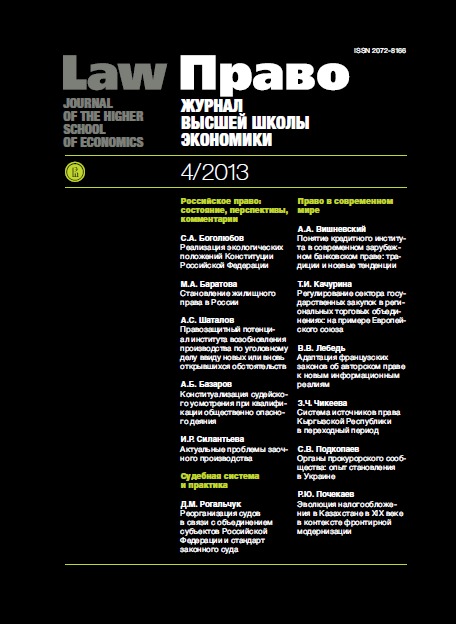The Trail to Integrated Understanding of Russia Legal Education has been Blazed. What Comes Next?
Abstract
The text is a review of the book by N.S. Bondar' Russian Legal Education as a Constitutional Value: National Traditions and Cosmopolitan Illusions (The Library of Judicial Constitutionalism series, Issue 3, Moscow, 2013). The review states that Bondar's book is the first separate work systematizing the problems of the modern Russian legal education. The review notices the conceptual and emotional complexity of the book despite its small size, and a serious contribution to arranging the discussion on Russian legal education in the form of a publication. There is an attempt to debate on some ideas expressed by N.S. Bondar'. In particular, he is skeptical about the Bologna process as to legal education. In response, an attempt has been made to consider the situation in a more constructive way allowing large centres of legal education to work in these conditions and use the bachelor — master pattern to improve the educational environment (which is not denied by the author) by prohibiting master programs in weak legal schools. N.S. Bondar' writes about the necessity to ensure the constitutional model of the modern lawyer which should overcome the extremities of enforcement and entrepreneurial models of lawyers and the erroneous in the author's opinion philosophy of legal pragmatism. In response, an attempt has been taken to show soft spots of lawyers educated under the constitutional model for working in the actual environment. A proposal has been made to implement various models of preparing lawyers in the centres of legal education without abolishing the architecture of legal education for the sake of a uniform model of preparing lawyers. This does not deny the necessity to process attentively constitutional law devices and ways of protecting the rights applicable to every legal area. As a conclusion, it should be said that the book by Bondar' has laid the foundation to realizing the current Russian legal education.
Copyright (c) 2013 Law Journal of the Higher School of Economics

This work is licensed under a Creative Commons Attribution-ShareAlike 4.0 International License.


















